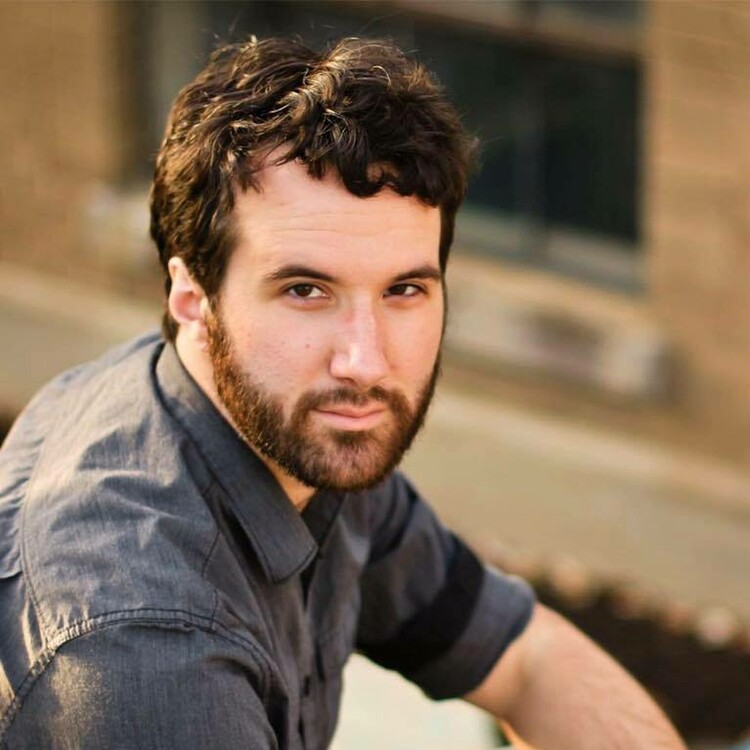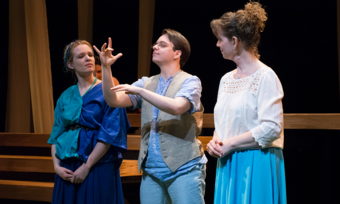Three Steps to Speaking Up For the Playwright
Step One: Recognize What’s Happening
There are questions within every rehearsal process about the text. It’s natural—if we’re using a script, our performance is based in the text. The conversation can start in a completely innocuous way: an actor and a director are working through a section of the script, and the actor says something along the lines of, “I don’t understand why I say blank,” or the director will say, “That just sounds odd when you say blank” and within a few minutes, an “and” has become a comma. The change doesn’t have to be made, and often while the actor and director are seeking clarity, they’re obscuring something waiting to be unlocked in the script. In most cases, these changes come from a lack of understanding, and this is often the first sign that a change is about to be made to the text.
Every production of a text is going to be different—but part of the beauty in that is that all the productions of All My Sons are building their performance from the same starting point. It is this unalterable interpretive act which makes for both the challenge and beauty of mounting a previously produced production. It separates producing original work from established scripts.
Most productions are not developmental for the script—a different sort of issue not within the scope of this post—and that usually means the text being used is effectively final. As is often the case, the playwright is usually not in the room, and so they have no say in the changes being made to their script. As a supporter of playwrights’ rights, I often feel that I must become the de facto voice of the writer, to protect the integrity of their text.
Step Two: Recognize When to Speak Up
But when is the appropriate time to speak up? When are you crossing a line? It depends on your role in the production. If you’re directly involved with the moment being tinkered with, then it is entirely within your rights to speak up about why the text shouldn’t be altered. If you aren’t involved directly with the moment, then pulling the director aside on a break or after rehearsal can be a good time to bring up the issue.
It’s also important how you approach it. You’ll encounter people with strong feelings on the subject, as well as those who have never before considered that they might be able to do just whatever they want with the text of a play. Whoever the person and whatever the feelings, you’ll need to be tactful. The creation of art can generate great emotion, but that doesn’t mean we should be afraid to speak up for things.
Simply asking why they felt the change was necessary might be a good place to start. Hopefully, they’ll give you a good justification, but often these types of changes stem from a misunderstanding of the text in some way. It becomes much easier to simply change a line than do the analysis work required to truly understand why that line exists in the text. From there, the conversation can be maneuvered into gently reminding them that they have signed a rights agreement for the show and that agreement (most likely) outlines that they can’t make changes to the text without first seeking permission. Sometimes seeking permission is impossible, and sometimes it is as simple as an email, but often it is more of a step than people want to take. This is usually because the change they are looking to make doesn’t actually have a justification. However, they need to be reminded that either permission needs to be sought, or the change legally can’t be made.
Step Three: Actually Speak Up
In an ideal world, the changing of texts without writer involvement wouldn’t be a problem. The pervasive justification of these types of changes being “everyone does it” is the exact reason why I know I need to start speaking up in the room, and I hope you’ll join me in doing the same. As a writer, it is always my hope that the words I’ve labored months and years over are being respected by those producing the work over the course of a few weeks. As a director, the most rewarding moments of any process are when an actor and I unlock a section of text we were finding exceptionally difficult—one where cutting, trimming, or changing words might have saved us from banging our heads against the wall.
Theater is a full sensory experience, and the text is the one element from which all of the others spring. If the solution seems to be to change the line to match another element of the production, that element probably came from somewhere other than a full and true understanding of the text as written. If blocking doesn’t match a line, then something is wrong with the blocking. As artists, if the agreement is to produce a specific text, then produce that text. If you’re creating something new, then that’s a discussion for another day.













Comments
The article is just the start of the conversation—we want to know what you think about this subject, too! HowlRound is a space for knowledge-sharing, and we welcome spirited, thoughtful, and on-topic dialogue. Find our full comments policy here
And it is this I print and post to the undergraduate theatre board. As a young dramaturg in university, I constantly have to alter my arguments to keep a grade and make change. All the while, I must keep a relationship with a student director afloat. Learning how and when to speak up is one of my biggest challenges. I hope with enough experience and time I will get better at it.
Thank you A.F. Freeman. Beautifully said. What you are talking about is so essential. I currently have a play of mine that has been translated and is being produced in a language I don't speak, so I have had to really take a leap of faith that what is currently on the page is the play that I wrote. In addition, the highly creative director often cuts things and then it will come up in a conversation later that he took that out because.... So I continue to insist that what I wrote, unless discussed, MUST be said, but I have no way to enforce that, under these circumstances. Your article got me thinking...wouldn't it be great to have, in theatre, like in film, to have a "script supervisor" in the room! Whenever I have worked as an actor on camera....you had better not be paraphrasing or changing things because if you do...BOOM...there is the script supervisor, like the dark fairy, to show you the sacred text, and make sure it doesn't happen again:) As a writer, I am always open to discussing changes, but only after they have been tried. I love that you said that those moment of unlocking those challenges in a text are the most rewarding to you as a director. As we all know from experience...great theatre is not born from easy choices.